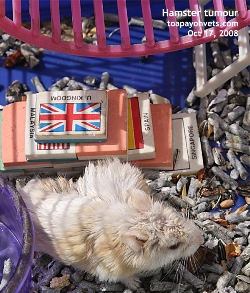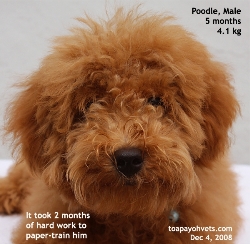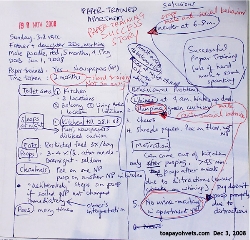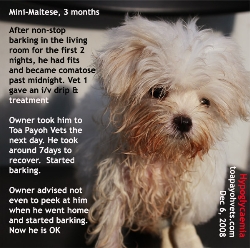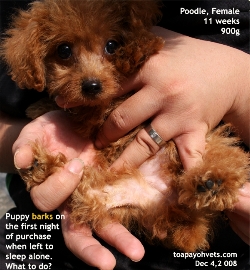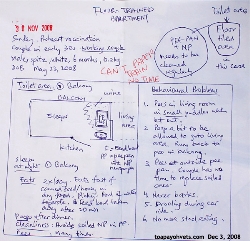3 Cases of Puppy Toilet-Training discussed at Toa Payoh Vets - Barking at night
On November 30,
2008, I had 3 different cases of toilet-training of
puppies. The details are written down and photographed
for ease of reading by readers.
Significant Findings
1. It takes a lot of time and hard work (perseverance
and consistency) to toilet train a puppy. Success
in paper-training in one case required keeping a close
eye on the puppy. As the owners were working, it took
2 months to successfully paper-train.
2. Confinement. The earlier the puppy is
confined (lst day home), the higher the success rate.
Confinement can be inside a playpen, room (balcony in
one of the 3 cases but kitchen is used by many owners)
or tethering by a leash. Singaporean owner seldom
thinks of tether as the puppy seller seldom recommends
this method.
3. Clean toilet area. This means changing
soiled newspapers promptly or cleaning grate/pee pan
many times a day. If the couple is busy at work, this
is not possible. So, the couple thinks that the puppy
deliberately pees "off target". The couple thinks that
the puppy can't urinate on the toilet area but does it
outside the pee pan/newspapers or grate. The real
reason is that the puppy does not want to step onto a
soiled toilet area and since the owner has not cleaned
up, the puppy eliminates on the fringes.
4. Tough
Love. Spanking on the backside is not
advised, but owners report success in such negative
reinforcement training.
5. Positive reinforcement training. Food treats
are still great motivators although lavish praises and
play after compliance are used. Say "good pup" or any
phrase and then give a food treat and praise.
There are various other factors involved in successful
toilet training. So much depends on the family
interactions, distractions and the intelligence of the
puppy to assess the owner's "dominance" or lack of.
Barking for
attention as the puppy does not want to sleep alone is
a big challenge to new puppy owners.
I advise re-locating the new puppy and his play pen to
the bedroom for the first few nights.
However, some puppy sellers advise ignoring the
barking. Unfortunately, the owner should not
play with the puppy on the first day. Let him settle
down in his crate/playpen on the first 2 days and
nights. How many owners can resist a new puppy and not
show it off to neighbours and friends?
Once the owner plays and spends much time with the
puppy, the intelligent puppy tends to bark at
night for a long time.
The owner comes out to peek and maybe
scolds the puppy (giving more attention). The puppy
barks more and more, disturbing the neighbours.
In one of my mini-Maltese cases, the owner could not
bring the puppy into the bedroom (her husband is
against this idea) and on the 3rd night of barking,
the Maltese fainted, had fits and was sent to a vet
past midnight. He was comatose.
The groggy puppy came to me the next day via a
referral from the pet shop puppy seller. The puppy
recovered after more than a week of being warded and
treated at Toa Payoh Vets. He started barking at the
Surgery but we ignored him. However, we ensured he was hand fed
and not get hypoglycemic (low blood sugar). He was not
keen on eating for the first 3 days and we had to hand
feed him. Otherwise he would develop fits and lapse
into a coma that would be hard to cure the 2nd time.
The Maltese went
home and tested the lady after 7 days at Toa Payoh
Vets. At night, he started barking
for attention as he had to live in the living room
where the maid and owners passed by. Bark and bark. He
was used to sleeping alone at night at Toa Payoh Vets
for the past 7 days so his barking for attention to
test the psychologist (human) was not getting him the
peeks and attention as in his previous experience.
Fortunately, the owner was able to ignore him on the
first night home and there were no problems and
financial expenditure for the lady! He is now well
adjusted to living in the living room and coming out
to play at fixed times. Give the puppy a daily
routine for feeding and playing and this will lead
to success in toilet training.
Many Singapore
owners do not get barking puppies but this
problem is a serious one as it has anti-social
nuisance in apartment living.
Therefore, the best way is to get the puppy home and
not start playing with it for a long time. Then expect
it to sleep alone. Some do. Some don't and those that
don't give the owners and their family members lots of
headaches.
Leave the puppy alone for 90% of the time on the first
3 days at home and the puppy should not be barking
throughout the night as he knows his lower hierarchy
in the human pack.
Till he grows up at 6 months of age and start his
nonsense of humping pillows grabbing people's legs and
urine-marking! Female puppies don't usually urine-mark
but male ones need to be properly trained or neutered
early to prevent anti-social problems for the
owner and family members.
Ignoring a barking small breed puppy like the
Chihuahua, mini-Maltese, Yorkshire and toy poodles
is not be good advice.
They just don't eat the next day and by the 2nd or 3rd
night, become hypoglycaemic. Soon they become comatose
and it is extremely difficult to treat them when the
owner delays seeking veterinary treatment in the
middle of the night. Once in a deep coma, the brain is
damaged and the puppy dies after a few days.
 TOA
PAYOH VETS
TOA
PAYOH VETS